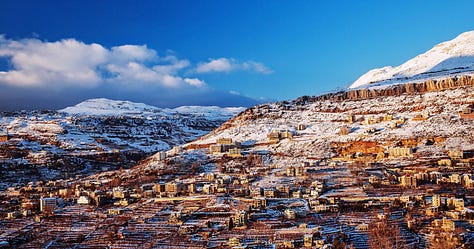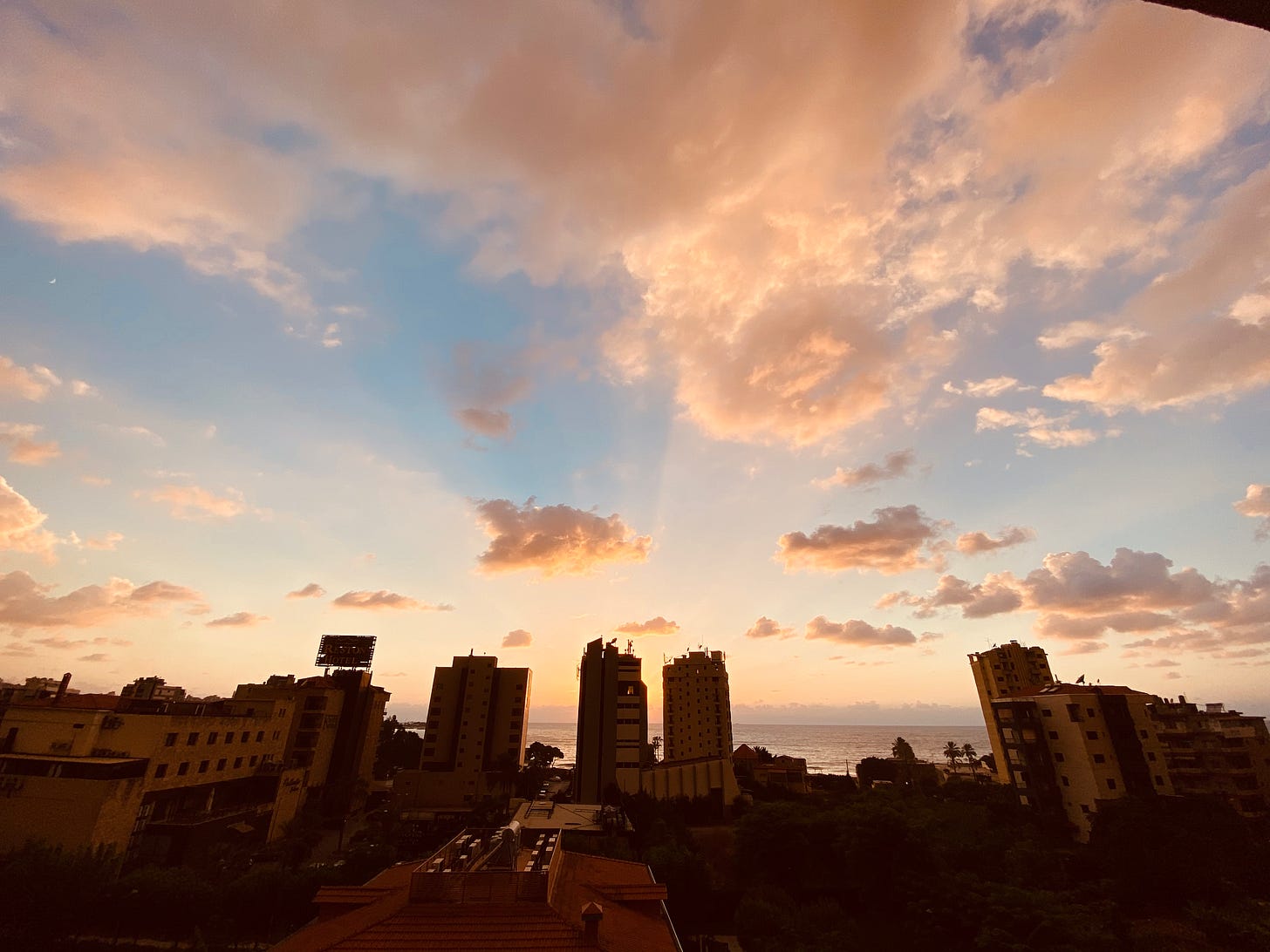Previously:
I arrived in Beirut after a chaotic journey and intense airport scrutiny. Joseph met me with two friends, and we navigated the vibrant city. As we talked, I shared my plans to start a Questioneer hub. His friends were shocked to learn I was staying with his family in a Palestinian camp, revealing they had never been there despite knowing Joseph for years. This hinted that my stay in Beirut would be more complex and challenging than expected.


It was getting late, and my energy was waning as my anxiety to reach the camp grew. First, we had to drop Joseph's friends off at their homes. As we drove up the steep and winding hills, the air swiftly turned cold and crisp, reminding me of winter days spent skiing at Snoqualmie Pass and Alpental in the PNW.
The chill in the air brought back fond memories of laughter and jabber on the school ski bus, enhancing the nostalgia of the moment in a way that took me by surprise. As we continued our drive, I was beginning to realize that many of my preconceptions about the Middle East were about to be challenged. The reality of what I was seeing, feeling, and experiencing here was far removed from what I had once imagined. Lebanon, often dubbed the "Switzerland of the East," offered the surprising possibility of skiing all day and then swimming in the Mediterranean in the evening. This delightful reality was just one of the many surprises this trip had in store.
Below, the skyline of Beirut twinkled like specks on a model train set, everything appearing surreal. Now atop the mountains, the Mediterranean stretched endlessly before us. An almost full moon hung heavily in the sky, resembling a giant pearl poised to dive into the sea.
Vinny's house was perched high in the mountains, shadowed by one of the most notorious prisons of the time a detail I only recently discovered. To get there, we passed through a checkpoint that felt like driving up to the gates of San Quentin without Johnny Cash riding shotgun. Painted red and deceptively mundane, this checkpoint resembled the everyday toll booths dotting American highways. However, the similarity ended there, as the guards, heavily armed with AK-47s, presented a far more menacing front than any toll collector ever could.
They conducted a thorough check of everyone's IDs, looking for wanted individuals and any signs of suspicious activity. "IDs, please," they motioned, using a hand gesture I didn't understand at the time. Reluctantly, I handed over my passport, despite knowing it's generally unwise to give your passport to anyone. Joseph's expression pleaded with me not to make a scene as he reassured me it was necessary. His friend, Pierre, who strikingly resembled the main character from Entourage and Vinny, also handed over their IDs.
An American, a Palestinian, and two Lebanese, a rare band of misfits, were immediately directed to the side area for a detailed inspection.
More military police approached and asked Joseph to step out of the car. My Arabic was virtually nonexistent then, making everything sound like a cacophony of anxious, threatening gibberish. I knew better than to ask questions; I didn't want to exacerbate our situation. When the military police stepped away, I quietly asked the Entourage look-alike, "Why did they take Joseph? What’s going on?"
"It's because he's Palestinian," he whispered back. "He'll be okay. They'll let him go after a thorough check and search. Normally, if he's with us, they don't detain him."
"But how can they tell he’s Palestinian? He looks like anyone else here," I questioned, naive to the subtle distinctions.
"The IDs are marked with 'Palestinian,' the person's religion, and which camp they live in. You can’t go anywhere without showing your ID, and most Arabs can tell if someone is Palestinian..."
"How?" I asked insistently.
"By their dialect and the way they speak," they noted. Joseph, however, possesses a rare talent, akin to managing 23 different languages, as he can mimic all Arabic dialects. This ability allows him to blend in effortlessly like a chameleon, a testament to his exceptional gifts. However, this skill is only useful until they request his ID, revealing his true identity.
As I watched Joseph being patted down, his arms spread against the wall like a criminal, I murmured, "So this is a normal thing for him to go through?"
"Yeah," Pierre sighed. "They'll let him go soon; he's done nothing wrong. It's just because he's Palestinian." This simple yet profound statement began to peel back the layers of a complex reality I was only starting to grasp.
Joseph, unlike his Lebanese friends, always had issues at checkpoints if they asked for his ID. This time, with us, the officials didn't scrutinize him as intensely, yet the air of tension was unmistakable.
Watching this unfold, I felt as though I had stepped back in time to the turn of the century in the deep South of the United States, where the echoes of deep-seated racism were eerily similar. Here, though, it wasn't about the color of one's skin, as all looked ostensibly the same; it was about heritage and origin, ingrained prejudices that cut just as deep.
In later discussions, I tried to convey the nuances of racism as understood in the States, where discrimination is often visible and color-coded, to the Arabs here, who found such concepts foreign. The irony was not lost on me; the discrimination I was witnessing was based not on skin color but on one’s lineage and the residue of a 25 year political & religious war.
Joseph returned to the driver's seat and resumed driving as if the interruption were merely a brief stop for coffee, not a tense encounter at a checkpoint. I watched, mouth agape, a silent outrage beginning to brew within me. This man, whom I had grown to respect and admire even more deeply than back in LA, navigated through layers of hate and discrimination with a grace that left me baffled. He wore a smile, his spirit undimmed by the harsh realities we'd just faced. Watching him, I felt like Lois Lane might have, catching her first glimpse of Clark Kent transforming into Superman, astounded and full of newfound respect.
As we neared the camp, we approached another checkpoint and my heart tightened as I saw the familiar setup of checkpoints flanking the road. "Fuck, more checkpoints," I muttered under my breath. Joseph glanced over, his voice calm, "It's okay. This time it'll be easier. They just need to track my comings and goings."
"What about me?" I asked shyly, unsure of what they might require of me.
"You’ll be fine, just let me handle the talking," he assured me, and I nodded in agreement. There I was, deep in it, what choice did I have? It was nearing 4 AM; where else could I possibly go, track down that Hilton in downtown Beirut?
As Joseph presented his ID and my passport at the checkpoint, the guards engaged in rapid, sharply articulated dialect that sounded chaotic to my ears. I braced myself, thinking, "There's no way these guards are going to let me in." But what I was quickly coming to understand, only a few hours into my Lebanese journey, was the sheer astonishment and skepticism everyone showed that an American was accompanying a Palestinian. Their disbelief was palpable, treating Joseph almost as if he were a liar or a thief, with a pompous, almost ridiculing attitude that I, an American, would be with him a Palestinian. It was as unlikely to them as claiming I was from planet Mars. Even when they saw my passport, their scrutiny didn’t ease. Unable to speak Arabic at the time to explain myself, I wondered if my ignorance was a shield or a hindrance. Sometimes, perhaps, ignorance really is bliss.
The soldier leaned into the car, looked me straight in the eye, and asked in very heavy and broken English: “You okay? You want help? He is friend? Or no?” A little scared and a little baffled, I found myself answering in heavy and broken English myself: “Yes, he friend, no problem,” and I gave him a thumbs up with a big grin. Joseph still makes fun of me to this day about how awkwardly I handled that situation.
They waved us through, and Joseph navigated the labyrinthine streets of the camp, so narrow that they seemed designed for Fiats and Mini Coopers, yet, improbably, cars were parked on both sides. How these vehicles were maneuvered into such tight spaces was beyond me a sorcery of spatial logistics that I would later come to regard as a marvel, one that could make even Evel Knievel tip his hat in awe of the deft skill required.
As we approached, the camp revealed itself like a worn pop-up book unfolding in layers to show a mosaic of everyday life. The struggle was etched into the stones and hung heavy in the air, its history almost tangible on the tongue. Windows were adorned with hanging laundry, wires criss-crossed overhead, and metal sheets served as makeshift roofs. Ladders repurposed as stairs led to rooftops where buckets and wells collected water for drinking and cooking. In stark contrast to the lively and elegant streets of Beirut just below, the camp was eerily silent, like stepping from a loud party into a hushed library.
The walls, made of cement patched and rebuilt over more than fifty years, bore the weight of history. They encapsulated ancient tears, sweat, and stories, seeping from the makeshift piping, narrating tales of resilience and survival in a place forged not just from materials, but from the sheer will of its inhabitants.
Joseph finally stopped the car at the literal end of the road. As we parked, he announced, "We are here."




